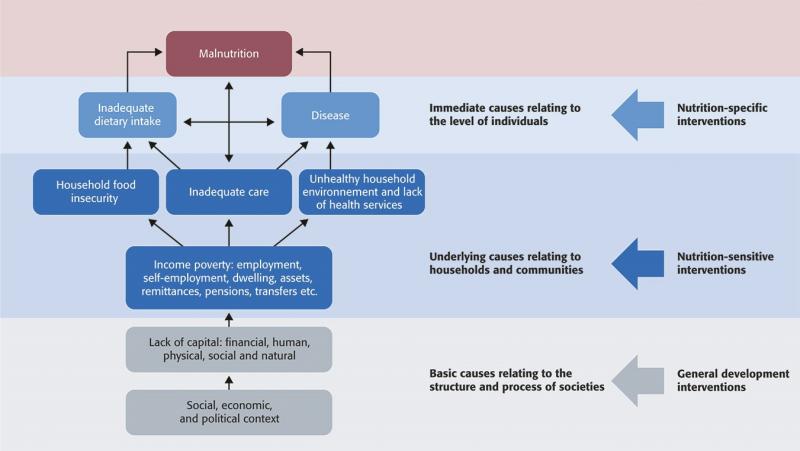Collection of reviews to prevent and treat acute malnutrition - using systematic evidence from reviews to inform decisions in the humanitarian sector
Saskia van der Kam, October 2018
"In the land of the blind, the one-eyed man is king” Desiderius Erasmus
|
The above quote describes the landscape when acute malnutrition became a focus in the humanitarian sector, about 30 years ago. While trying to find our footing, the humanitarian nutrition sector relied heavily on expert opinion, experience, and trial and error for the treatment of severe acute malnutrition. Slowly, research relevant for the humanitarian setting began to be documented and implemented. We read all publications and other material we could get, though that was quite limited in the pre-internet era. Disagreements within the organisation were solved by slamming papers on the desks of colleagues, urging them to read up and keep up. Over the years, the number of publications grew steadily until it became unmanageable when the internet became widely available. Today, there is a plethora of research papers published on many different, specific nutrition topics. The beauty of high quality systematic reviews is that they provide a summary of the best and most relevant research evidence available addressing specific questions. Good systematic reviews also indicate the strength of their evidence and are kept up-to-date with new emerging evidence. Recently, a disagreement within Médecins Sans Frontières (MSF) on replacing standard iron and folate supplements with supplements containing multiple micronutrients for pregnant women to prevent anaemia was resolved with the help of the latest Cochrane systematic review. This review showed that both types of supplements showed similar results in the prevention of anaemia, and that multiple micronutrient supplementation provides additional advantages for the baby. Based on that, it was decided to also include micronutrients in the supplementation guidance for pregnant women. Using systemic reviews saved time and energy and it avoided decisions based on beliefs, unsubstantiated publications and personal opinions.
|
Acute malnutrition in an emergency context refers to people, mainly children, whose intake of macro and micronutrients do not meet their physical needs. This results in people who are too thin, have fluid retention (kwashiorkor) and develop metabolic disorders. This is caused by not having enough food, by a lack of micronutrients or due to disease; often these occur simultaneously. The UNICEF framework of the causes of malnutrition emphasises the need for a multi-sectoral and holistic approach for both treatment and prevention of malnutrition.
|
Right now, a growing number of systematic reviews are available and we are at the point where we need a carefully thought-out approach to find the highest quality systematic reviews to answer specific questions. The Cochrane special collections on treatment of acute malnutrition and prevention of acute malnutrition, and the complementary nutrition collection of the Evidence Aid group (focused on prevention and treatment of acute malnutrition in emergencies and humanitarian crises), enable MSF’s nutrition specialists to look up the latest robust evidence efficiently.
In addition, systematic reviews not only help to find a way in published research, but can also highlight the lack of research. Topics like kwashiorkor (complicated severe acute malnutrition) is rarely mentioned in publications, and there isn’t much primary research on it. As a result, knowledge of how best to prevent and treat kwashiorkor remains lacking (Briend, 2014).
The humanitarian nutrition sector has come a long way since those early days of finding our way while near-blind. Over the years, as research increased and systematic reviews developed, our vision changed. While a few blind spots remain, systematic reviews are now converging our multi-facetted eyes, helping to find pathways to better and higher quality research and treatment.
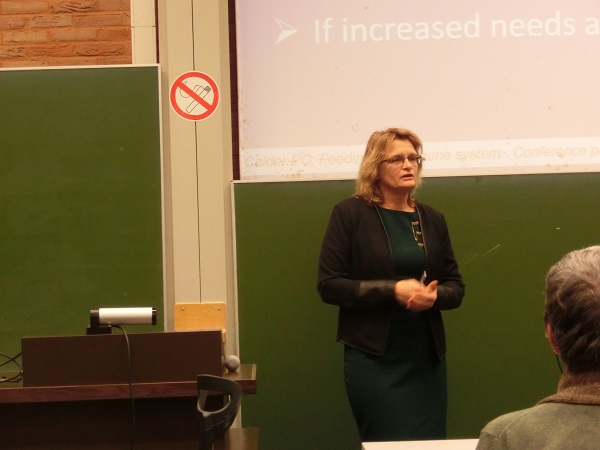 |
About the author
Saskia van der Kam is a nutrition advisor with Médecins Sans Frontières Amsterdam (MSF). For the past 30 years, she worked on acute malnutrition in the humanitarian sector with various actors, mainly with MSF. Her daily work is to advice MSF’s programs on issues related to food and nutrition, such as strategic decision-making, implementation of programs and patient care.
|
New nutrition reviews in Cochrane Library
Omega‐3 fatty acid addition during pregnancy
An update of a Cochrane review on Omega-3 fatty acid addition during pregnancy has recently been published. In this update the conclusions of the review have changed, and it now shows that Omega-3 is associated with a reduction in preterm and early preterm birth. You can read the review here
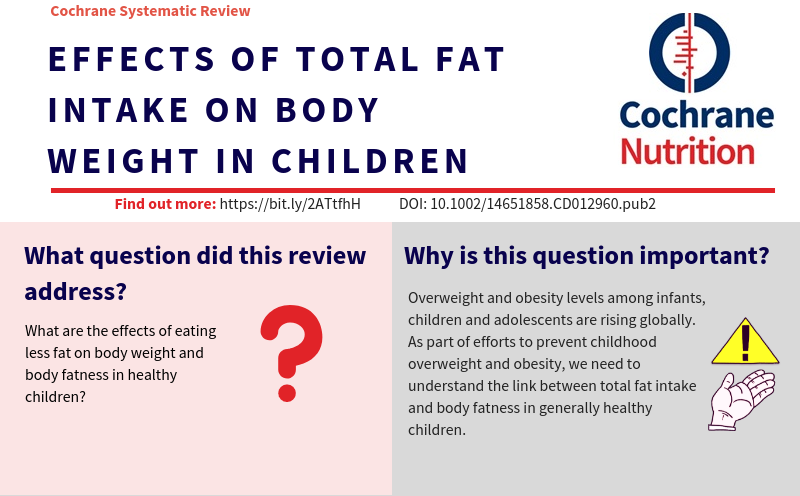 |
Effects of total fat intake on body weight in children. Click here to view the complete infographic Read more about the review here |
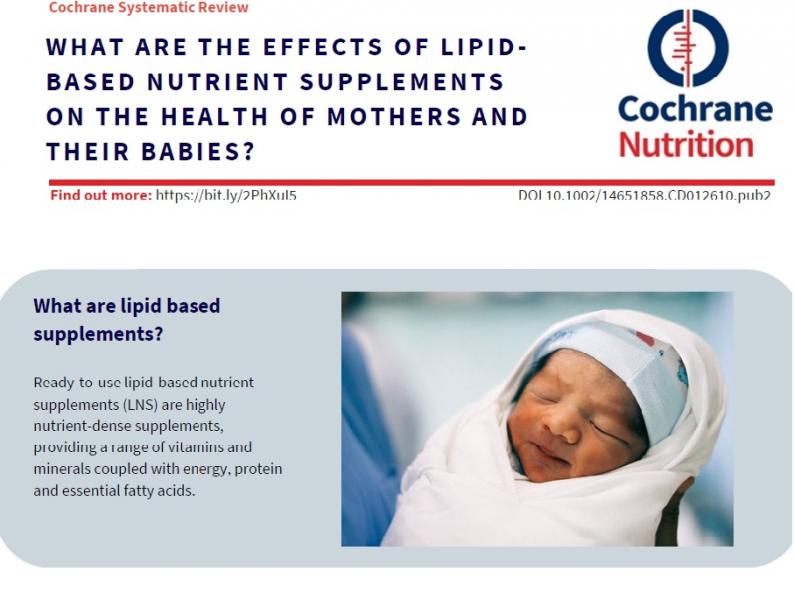 |
What are the effects of lipid-based nutrient supplements on the health of mothers and their babies? Click here to view the complete infographic Read more about the review here |
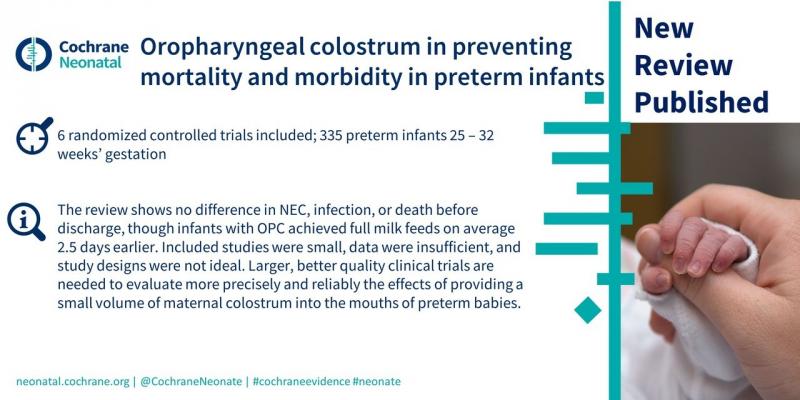 |
Oropharyngeal colostrum in preventing mortality and morbidity in preterm infants See blogshot here Read more about the review here |
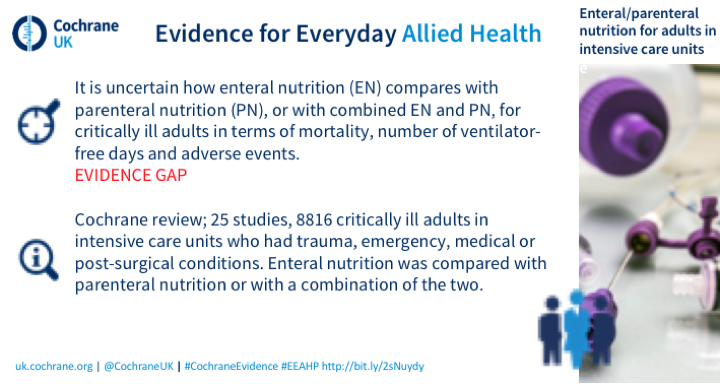 |
Enteral and parenteral nutrition for adults in intensive care units |
Low protein diets for non-diabetic adults with chronic kidney disease
This review update examines the effects of low protein diets in non-diabetic adults with chronic kidney disease on slowing the progression of kidney disease, therefore delaying the need for dialysis treatment.
Read full review here
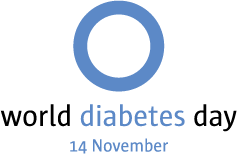
November is Diabetes awareness month
November is diabetes awareness month, and 14 November is World Diabetes Day. Diabetes mellitus (T2DM), especially type 2 diabetes mellitus, is a substantial health problem worldwide, affecting more than 425 million people at present (NCD-RisC, 2016). There have been increasing efforts to prevent and delay the progression of T2DM and its related complications in people at high risk.
Lifestyle modifications, including dietary changes, are part of the prevention and management of diabetes. Evidence from Cochrane reviews may help patients and practitioners to make decisions regarding which interventions to implement.
The evidence on the effects of diet, physical activity, or both in people at increased risk of developing type 2 diabetes mellitus has been summarized in Cochrane Clinical answers (CCAs). CCAs provide a readable, digestible, clinically-focused entry point to rigorous research from Cochrane Reviews, and are designed to be actionable and to inform point-of-care decision-making. The review evaluated the effects of diet, physical activity or both on the prevention or delay of T2DM and its associated complications in people at increased risk of developing T2DM. See the CCA here and to read the review here
A recent overview summarized evidence from Cochrane systematic reviews on the benefits and harms associated with interventions for treating women who develop diabetes during pregnancy (gestational diabetes mellitus, GDM) and their babies. GDM, if poorly managed, can cause complications for the mothers during pregnancy (e.g. pre-eclampsia and caesarean section) and the babies (e.g. being large, having low blood sugar and jaundice); and place both mothers and their babies at an increased risk of developing T2DM later in their lives (ADA 2004). Read the overview here
References:
NCD-RisC (2016). 'Worldwide trends in diabetes since 1980: a pooled analysis of 751 population-based studies with 4.4 million participants'. Lancet (London, England). England, 387(10027), pp. 1513–1530. doi: 10.1016/S0140-6736(16)00618-8.
American Diabetes Association (ADA) (2004). ‘Gestational diabetes mellitus’. Diabetes Care. 27 Suppl 1: S88–S90. doi: 10.2337/diacare.27.2007.S88.
Publications
Global nutrition policy review 2016-2017
The WHO has published the second comprehensive analysis of country progress in creating enabling policy environments for promoting diets and nutrition. Read more
The 2018 Global Nutrition Report was launched on Thursday 29 November. Read more
Nutrition evidence in action
Omega‐3 fatty acid guidelines during pregnancy
The findings from the Cochrane review assessing Omega 3 fatty acid addition during pregnancy have been used by a team from South Australian Health and Medical Research Institute (SAHMRI), including authors of the omega-3 review, to develop a suite of resources and information about omega-3 fatty acids, both for pregnant women and health professionals. These resources can accessed be accessed here.
Nutrimedia, a Spanish project that analyses the certainty of nutritional messages
Gonzalo Casino (Pompeu Fabra University, Barcelona) and Pablo Alonso (Iberoamerican Cochrane Centre)
Nutrimedia is a Spanish nutritional information website for the general public released in 2017. One of its key content is the evaluation of the credibility of messages about nutrition and health, based on the best scientific evidence available. Nutrimedia evaluates four types of messages: food myths, news from the press and advertising claims, identified and selected by the team of researchers based on its experience, and questions posed by the public in a questionnaire survey. The objective is to make plain language explanations and friendly presentations available to the public regarding the degree of certainty of evidence for messages on which the information is dubious or contradictory, such as "drinking alcohol in moderation is good for your health" or "a gluten-free diet is beneficial for healthy adults ".
The scientific methodology coupled with the use of plain language to explain the process, the results and their implications is a distinctive feature of Nutrimedia. We have a protocol for the evaluation of all nutritional messages. After formulating a structured clinical question in a PICO format (patient, intervention, comparison, and outcome) associated with a specific message, the best available scientific evidence is identified and selected following a pragmatic approach, prioritizing clinical guidelines and systematic reviews. The evaluation of the quality of the evidence about the effects of nutritional interventions is conducted using the GRADE approach. Based on this evaluation, the certainty level of a specific message is classified into five categories: true, probably true, probably false, false, and uncertain. In order to facilitate the understanding of the most difficult concepts, short videos and interactive summary of findings tables are also produced. In addition to summaries on the website, detailed technical reports are also produced.
The consultation of the Cochrane Database of Systematic Reviews is a specific step within our evaluation process protocol. Finding a Cochrane systematic review is always good news as the methodology is very rigorous, and very often they include summary of findings tables. This facilitates our evaluation enormously and the preparation of our reports. Cochrane systematic reviews have been used in the evaluation of numerous messages already, such as "breastfeeding prevents obesity" or "white bread promotes obesity compared to wholemeal bread".
Nutrimedia is a joint project of the Observatory of Scientific Communication of the Pomepu Fabra University and the Iberoamerican Cochrane Centre. The Nutrimedia team, includes experts in the methodology of medical research, nutrition and communication. It is partially funded by the Spanish Foundation for Science and Technology of the Spanish Ministry of Science, Innovation and Universities.
News & upcoming conferences
- Wellcome and the World Health Organization (WHO) hosted an expert meeting in October 2018 that brought together leading scientists and promising early-career researchers to invigorate nutrition science. Read more
- Cochrane Nutrition hosted a community meeting at the 25th Cochrane Colloquium. Read more
- 3rd African Cochrane Indaba, Cape Town from 25-26 March 2019. Find out more
- International Congress of Dietetics, Cape Town from 15-18 September 2020. Find out more
- 6th International conference on Nutrition & Growth, Valencia, Spain from 7-9 March 2019. Find out more
- World Public Health Nutrition Congress (WPHNA), Brisbane, Australia from 1 March to 3 April 2020 Find out more

